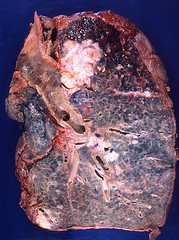Posted on 13 June 2011. Tags: alimta, ares, cancer institute, chemotherapy, chemotherapy regimen, clinical context, lilly, lung cancer patients, placebo, study author
 A recent research study suggests that extending chemo therapy sessions for lung cancer patients will delay the return of the cancer. The current practice is to give patients with advance lung cancer four courses of two chemotherapy medications and wait until it returns.
A recent research study suggests that extending chemo therapy sessions for lung cancer patients will delay the return of the cancer. The current practice is to give patients with advance lung cancer four courses of two chemotherapy medications and wait until it returns.
The Spanish scientists admit that the results are still preliminary but they said that staying on pemextrexed (Alimata) delayed the return of the disease.
Dr. Neal Ready, a professor at the Duke Cancer Institute, said that this is the first study with positive results where the same treatment is continued. He said that most of the similar studies with positive results required changing the chemotherapy regimen. Ready added that even though they do not have the overall survival rate yet, this study will highly influence oncologists to continue chemotherapy treatment following the standard combination.
In this research study, nearly a thousand patients with advanced lung cancer were given the standard four course treatment of Alimta and cisplatin. 539 patients whose condition stabilized were randomly chosen to receive continued dose of Alimta or a placebo.
Those who took Alimta lived around 4.1 months without the recurrence of the disease in contrast to 2.8 months in the group which took placebo.
Dr. Luis Paz-Ares, study author, said that there was a significant decrease of the progression of lung cancer which they believe is enough to support the use of the treatment regimen in a clinical context.
The findings were presented at the American Society of Clinical Oncology annual meeting Sunday. In addition, the study is funded by Lilly, the makers of Alimta.
Posted in Health
Posted on 02 June 2011. Tags: cancer institute, electromagnetic fields, international agency for research on cancer, international group, interphone, microwaves, radio frequency, radio television, types of cancer, use of hands
 Radiation emitted from a mobile phones is “possibly carcinogenic” and may cause a certain type of brain cancer called glioma, says the International Agency for Research on Cancer or IARC, which is under the World Health Organization.
Radiation emitted from a mobile phones is “possibly carcinogenic” and may cause a certain type of brain cancer called glioma, says the International Agency for Research on Cancer or IARC, which is under the World Health Organization.
The international group of experts put radio-frequency electromagnetic fields, which are emitted from cellphones, microwaves, radar, radio, television, and wireless signals, in the same category as chloroform, coffee, DDT and lead.
“Possibly carcinogenic” is the third-highest rating by IARC. It is below “carcinogenic to humans” like tobacco and “probably carcinogenic” like diesel exhaust. However, experts say classifying radiation and other agents as “possibly carcinogenic” does not automatically mean they can cause cancer, and the finding should not alter people’s habits on cellphone.
Over the previous week, several scientists from various countries reviewed many existing studies, which include IARC’s Interphone study that claimed that over half an hour every day within 10 years period can increase the risk of having glioma by 40 percent.
However, the expert panel concluded that there was limited evidence that use of cellphone was linked to brain tumors and other types of cancer. Yet, World Health Organization warns people against frequent and lengthy use of mobile phones.
Although additional research is required, it is important to take practical measures that would reduce exposure to radiation such as use of hands-free devices, as well as texting, said Christopher Wild, director of IARC.
Also, children, teens and pregnant women should use cellphones as strictly as possible since they are at higher risk to absorb radiation, said head of the Rotary Cancer Institute Dr. GK Kath at AIIMS.
Posted in Health
 A recent research study suggests that extending chemo therapy sessions for lung cancer patients will delay the return of the cancer. The current practice is to give patients with advance lung cancer four courses of two chemotherapy medications and wait until it returns.
A recent research study suggests that extending chemo therapy sessions for lung cancer patients will delay the return of the cancer. The current practice is to give patients with advance lung cancer four courses of two chemotherapy medications and wait until it returns.
 Radiation emitted from a mobile phones is “possibly carcinogenic” and may cause a certain type of brain cancer called glioma, says the International Agency for Research on Cancer or IARC, which is under the World Health Organization.
Radiation emitted from a mobile phones is “possibly carcinogenic” and may cause a certain type of brain cancer called glioma, says the International Agency for Research on Cancer or IARC, which is under the World Health Organization.